英语被动句的汉译
- 格式:pptx
- 大小:309.83 KB
- 文档页数:22
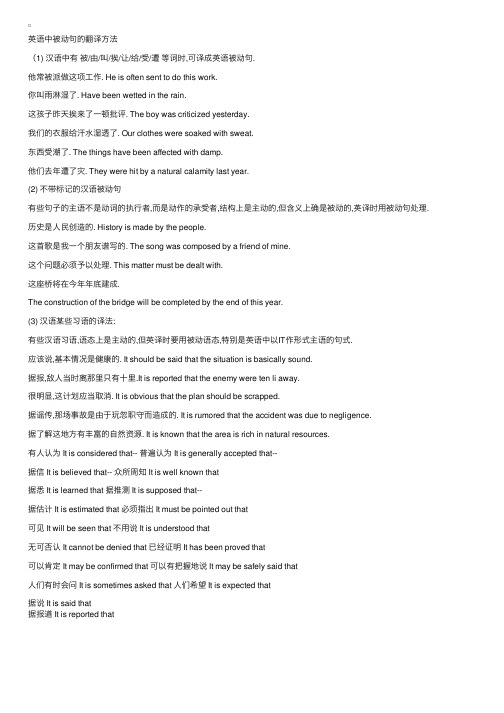
英语中被动句的翻译⽅法(1) 汉语中有被/由/叫/挨/让/给/受/遭等词时,可译成英语被动句.他常被派做这项⼯作. He is often sent to do this work.你叫⾬淋湿了. Have been wetted in the rain.这孩⼦昨天挨来了⼀顿批评. The boy was criticized yesterday.我们的⾐服给汗⽔湿透了. Our clothes were soaked with sweat.东西受潮了. The things have been affected with damp.他们去年遭了灾. They were hit by a natural calamity last year.(2) 不带标记的汉语被动句有些句⼦的主语不是动词的执⾏者,⽽是动作的承受者,结构上是主动的,但含义上确是被动的,英译时⽤被动句处理.历史是⼈民创造的. History is made by the people.这⾸歌是我⼀个朋友谱写的. The song was composed by a friend of mine.这个问题必须予以处理. This matter must be dealt with.这座桥将在今年年底建成.The construction of the bridge will be completed by the end of this year.(3) 汉语某些习语的译法:有些汉语习语,语态上是主动的,但英译时要⽤被动语态,特别是英语中以IT作形式主语的句式.应该说,基本情况是健康的. It should be said that the situation is basically sound.据报,敌⼈当时离那⾥只有⼗⾥.It is reported that the enemy were ten li away.很明显,这计划应当取消. It is obvious that the plan should be scrapped.据谣传,那场事故是由于玩忽职守⽽造成的. It is rumored that the accident was due to negligence.据了解这地⽅有丰富的⾃然资源. It is known that the area is rich in natural resources.有⼈认为 It is considered that-- 普遍认为 It is generally accepted that--据信 It is believed that-- 众所周知 It is well known that据悉 It is learned that 据推测 It is supposed that--据估计 It is estimated that 必须指出 It must be pointed out that可见 It will be seen that 不⽤说 It is understood that⽆可否认 It cannot be denied that 已经证明 It has been proved that可以肯定 It may be confirmed that 可以有把握地说 It may be safely said that⼈们有时会问 It is sometimes asked that ⼈们希望 It is expected that据说 It is said that据报道 It is reported that。

被动语态的翻译英语中被动语态使用范围很广,凡是在不必或不愿说出或无从说出施动者以及为了便于连贯上下文或者为了强调动作的承受者等场合,往往都用被动语态。
英语被动句的翻译主要有以下几种情况:一、译成汉语主动旬。
1.原句中的主语、谓语不变,译文中没有表示被动的标志,如“被、把”字等,形式上是主动句,表达被动意义。
例如:On Practice has been translated into many foreign languages.《实践论》已译成许多国家的文字。
The whole country was armed in a few days.几天以内,全国就武装起来了。
2.原句中的主语移到谓语之后,译作宾语。
Another middle school has been set up in our district.我们区又办了一所中学。
1,200 people had been saved soldiers in the earthquake.在地震中,战士们已救出1200人。
3.译成带表语的主动句。
The decision to attack was not taken lightly.进攻的决定不是轻易作出的。
In the old society,women were looked down upon.在旧社会,妇女们是受歧视的。
4.含主语从句的被动句型译为主动句。
以it作形式主语的英语句子,翻译时常要转为主动形式,有时可加上“有人”、“大家”、“我们”等不确定主语。
例如:It is reported that the enemy has been breeding new strains of killer viruses.据报道敌人正在培育新的杀人病毒。
It is suggested that meeting be put off tillnext Monday。
有人建议会议推迟到下星期一举行。
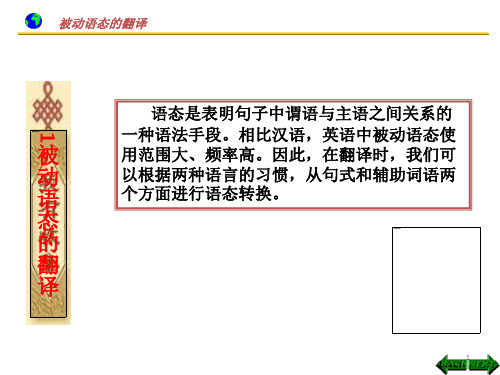
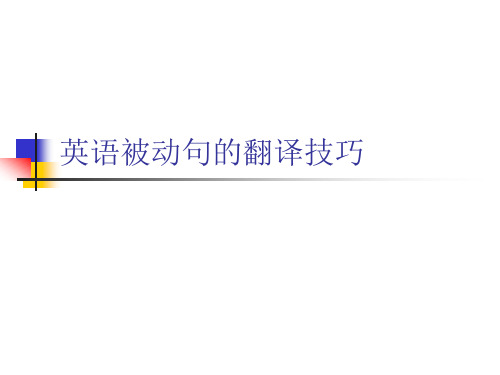
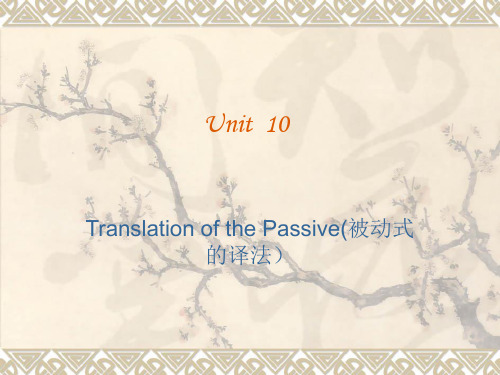
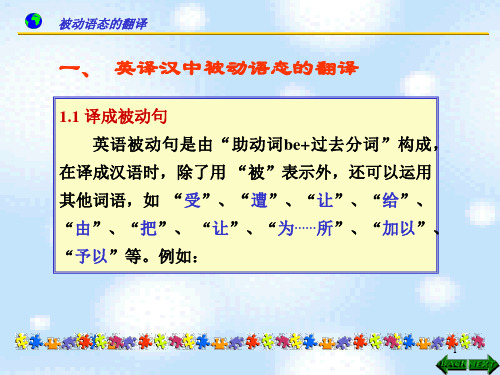
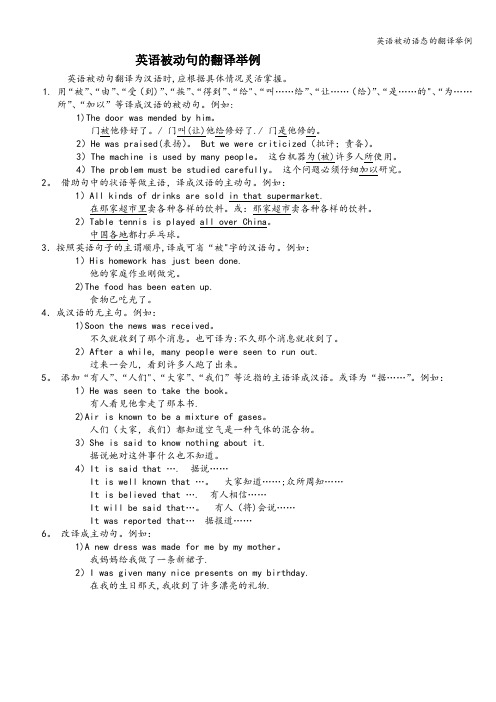
英语被动语态的翻译举例英语被动句的翻译举例英语被动句翻译为汉语时,应根据具体情况灵活掌握。
1. 用“被”、“由”、“受(到)”、“挨”、“得到”、“给"、“叫……给”、“让……(给)”、“是……的"、“为……所”、“加以”等译成汉语的被动句。
例如:1)The door was mended by him。
门被他修好了。
/ 门叫(让)他给修好了./ 门是他修的。
2)He was praised(表扬)。
But we were criticized(批评;责备)。
3)The machine is used by many people。
这台机器为(被)许多人所使用。
4)The problem must be studied carefully。
这个问题必须仔细加以研究。
2。
借助句中的状语等做主语,译成汉语的主动句。
例如:1)All kinds of drinks are sold in that supermarket.在那家超市里卖各种各样的饮料。
或:那家超市卖各种各样的饮料。
2)Table tennis is played all over China。
中国各地都打乒乓球。
3.按照英语句子的主谓顺序,译成可省“被"字的汉语句。
例如:1)His homework has just been done.他的家庭作业刚做完。
2)The food has been eaten up.食物已吃光了。
4.成汉语的无主句。
例如:1)Soon the news was received。
不久就收到了那个消息。
也可译为:不久那个消息就收到了。
2)After a while, many people were seen to run out.过来一会儿,看到许多人跑了出来。
5。
添加“有人”、“人们"、“大家”、“我们”等泛指的主语译成汉语。
或译为“据……”。
例如: 1)He was seen to take the book。
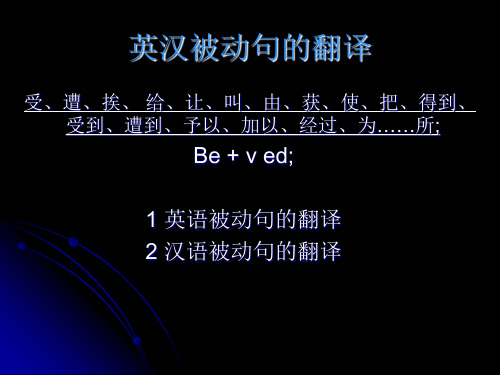
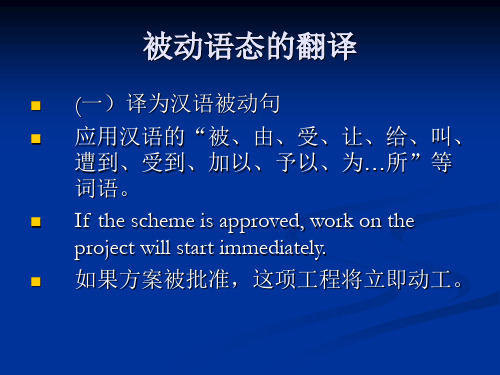

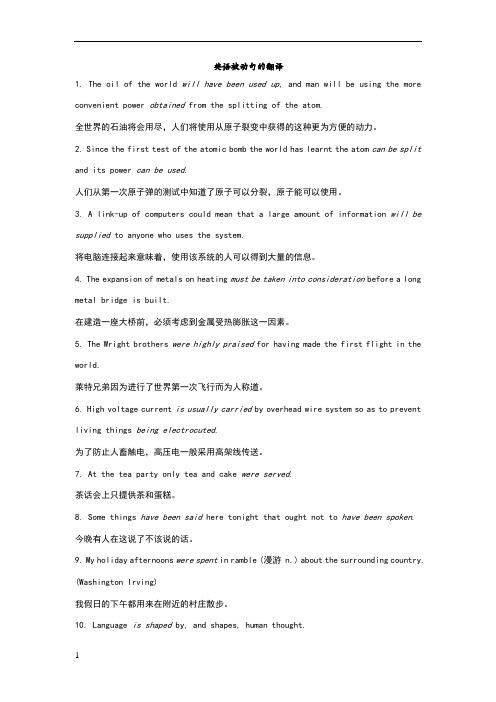
英语被动句的翻译1. The oil of the world will have been used up, and man will be using the more convenient power obtained from the splitting of the atom.全世界的石油将会用尽,人们将使用从原子裂变中获得的这种更为方便的动力。
2. Since the first test of the atomic bomb the world has learnt the atom can be split and its power can be used.人们从第一次原子弹的测试中知道了原子可以分裂,原子能可以使用。
3. A link-up of computers could mean that a large amount of information will be supplied to anyone who uses the system.将电脑连接起来意味着,使用该系统的人可以得到大量的信息。
4. The expansion of metals on heating must be taken into consideration before a long metal bridge is built.在建造一座大桥前,必须考虑到金属受热膨胀这一因素。
5. The Wright brothers were highly praised for having made the first flight in the world.莱特兄弟因为进行了世界第一次飞行而为人称道。
6. High voltage current is usually carried by overhead wire system so as to prevent living things being electrocuted.为了防止人畜触电,高压电一般采用高架线传送。
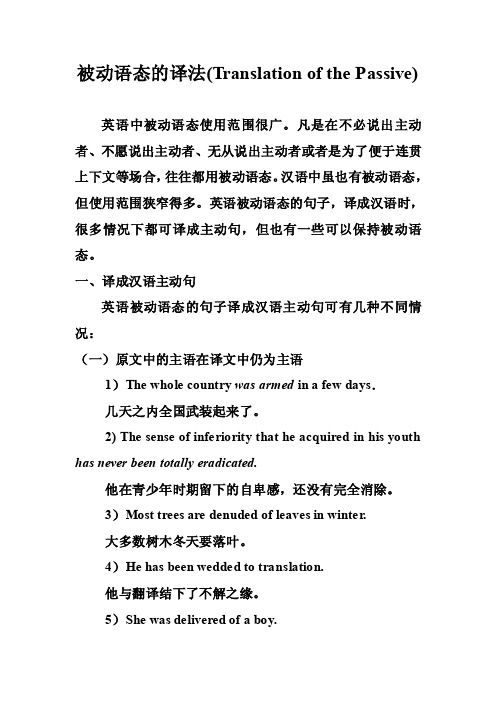
被动语态的译法(Translation of the Passive)英语中被动语态使用范围很广。
凡是在不必说出主动者、不愿说出主动者、无从说出主动者或者是为了便于连贯上下文等场合,往往都用被动语态。
汉语中虽也有被动语态,但使用范围狭窄得多。
英语被动语态的句子,译成汉语时,很多情况下都可译成主动句,但也有一些可以保持被动语态。
一、译成汉语主动句英语被动语态的句子译成汉语主动句可有几种不同情况:(一)原文中的主语在译文中仍为主语1)The whole country was armed in a few days.几天之内全国武装起来了。
2) The sense of inferiority that he acquired in his youth has never been totally eradicated.他在青少年时期留下的自卑感,还没有完全消除。
3)Most trees are denuded of leaves in winter.大多数树木冬天要落叶。
4)He has been wedded to translation.他与翻译结下了不解之缘。
5)She was delivered of a boy.她生了一个男孩。
6) Visitors are requested to wait.来宾请等候。
7) He was given a prize.他得了奖。
8) I have the honor of being elected.我荣幸地当选了。
(二)原文中的主语在译文中作宾语1)By the end of the war 800 people had been saved by the organization,but at a cost of over 200 Belgian and French lives.战争结束时,这个组织拯救了八百人,但那是以二百多比利时人和法国人的生命为代价的。
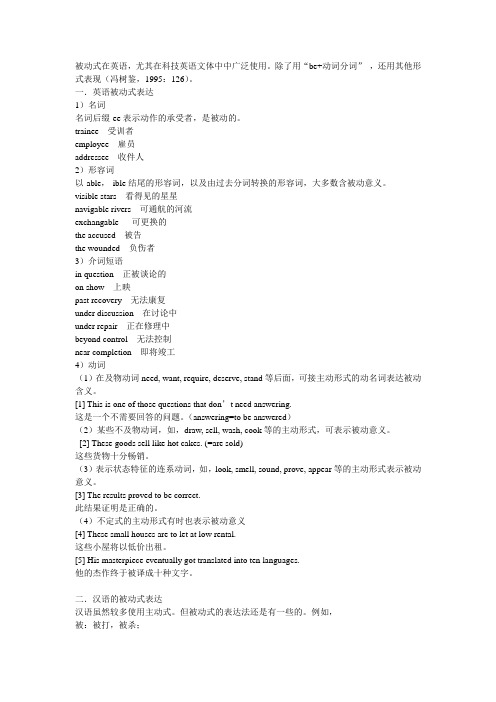
被动式在英语,尤其在科技英语文体中中广泛使用。
除了用“be+动词分词”,还用其他形式表现(冯树鉴,1995:126)。
一.英语被动式表达1)名词名词后缀-ee表示动作的承受者,是被动的。
trainee 受训者employee 雇员addressee 收件人2)形容词以-able,-ible结尾的形容词,以及由过去分词转换的形容词,大多数含被动意义。
visible stars 看得见的星星navigable rivers 可通航的河流exchangable 可更换的the accused 被告the wounded 负伤者3)介词短语in question 正被谈论的on show 上映past recovery 无法康复under discussion 在讨论中under repair 正在修理中beyond control 无法控制near completion 即将竣工4)动词(1)在及物动词need, want, require, deserve, stand等后面,可接主动形式的动名词表达被动含义。
[1] This is one of those questions that don’t need answering.这是一个不需要回答的问题。
(answering=to be answered)(2)某些不及物动词,如,draw, sell, wash, cook等的主动形式,可表示被动意义。
[2] These goods sell like hot cakes. (=are sold)这些货物十分畅销。
(3)表示状态特征的连系动词,如,look, smell, sound, prove, appear等的主动形式表示被动意义。
[3] The results proved to be correct.此结果证明是正确的。
(4)不定式的主动形式有时也表示被动意义[4] These small houses are to let at low rental.这些小屋将以低价出租。
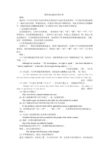
简析英汉被动句的互译摘要:被动句—当主语不是行为动作的发出者而是行为动作的承受者时,句子就含有被动意味了。
被动句表示的是一种被动语态,在英语中和汉语中都很常见。
因此,在两种语言的翻译中,把握好被动句的翻译很重要!本文简单介绍了英汉互译的几种情况!1汉语被动句的英译汉语的被动句,大体可分为两类:一是用助词“被”,“受”,“遭”,“给”,“叫”,“让”等为标记,表示较强的被动意义。
二是形式上是主动式,但意义上是被动式,即:意念上的汉语被动句。
主语是谓语动词的承受者。
这两类句子在译成英语时都要用被动语态。
当然,还有一些特殊情况,及汉语某些习语的译法。
1.1带有被动标记的汉语被动句这类句子,一般表示较强的被动意义,着重于被动的动作。
此类句子可以按照英语的惯常用法,相应地译成英语的被动句子。
用助词“被”,“受”,“遭”,“给”,“叫”,“让”等为标记。
例如:(1)“没有调查就没有发言权”这句话,虽然曾经被人讥为“狭隘经验论”的,我却至今不悔;……Although my assertion , “ No investigation , no right to speak ”, has been ridiculed as “ narrow empiricism ” , to this day I do not regret having made it ;……《毛泽东选集》三卷, 749页(2)在这里,可以听到最荒唐的新闻,如某处的大蜘蛛怎么成了精,受了雷击。
In the teahouses one could hear the most absurd stories , such as how in a certain place a huge spider had turned into a demon and was then struck by lighting .老舍《茶馆》(3)没有一个人把小草叫做“大力士”,但它的力量之大,的确是世界无比。